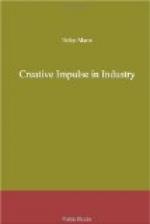school in the same spirit. Young people will
stand in the relation of partners as well as pupils
to the adults associated with them. If the school
and the workshop experience gives its pupils a regard
for high accomplishment it will be unnecessary to
stress the fact that as responsible members of the
working staff the learners are not on a footing with
the expert workers. The teachers or shop managers
will help the younger members to gain the knowledge
and facility which they have acquired as fellow members
of an enterprise In which all have a common interest
The participation of the young members in the enterprise
will be great or small depending upon their achievement
of standards. For instance, in the case of office
work whether the individual children are entrusted
with the correspondence, bookkeeping or banking, will
depend upon whether or not they have achieved the
adult standards in the shop for such business details.
But standards in business accounting, in estimating
costs, in planning operations, and in technique, will
not be maintained as they usually are in industrial
schools for the sake of the training, but for the
purpose of carrying forward successfully the actual
work with which the shop is concerned. While the
educational experience is concerned in part with appreciation
of workmanship, creative inspiration in modern industry
will never be a common experience until the workers
gain an understanding and recognise the significance
of their special enterprise in relation to other industrial
enterprises and to the business of wealth production
as a whole.
If the school experience is educational, the interest
of the pupils in subject matter will not end with
the solution of their shop problems or with their
experience in industry. The above outline of tentative
school subjects representing as they do the solution
of the problems of a specific industry signifies merely
the starting point of an adventure for young people
in the serious affairs of adult life. There will
be a large margin for choice in the election of subjects
in which individual children will care to specialize
but these subjects will be related more or less directly
to the industry. The pupils will doubtless be
freer in the second year than in the first to choose
where they want to specialize as they will have had
time in which to establish their ground work.
But the election of studies in a two years’
half-time course will not admit of flights very far
afield of the subject in hand and of the problems
originally set up. Those children who find that
their participation in a productive enterprise is
an enriching experience may elect to follow some special
leads in science, in the past and present history
of manufacture and commerce, in economics, in literature
or in art. The intention of the school is to open
up opportunities for such expansive expressions of
the concrete experience as time and the capacity of
the pupils admit, provided that the expression has
its valid relation to the promotion or the enrichment
of the enterprise of which they are responsible members.




